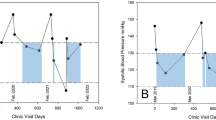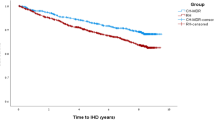Abstract
Rapid treatment to target in hypertension may have beneficial effects on long-term outcomes. This has led to a new recommendation in the 2018 European hypertension guidelines for patients with grade II/III hypertension to be treated to target within three months. However, whether it is feasible and safe to quickly manage treatment-naïve grade II/III hypertension to target was unclear. We examined this using a single-centre before and after interventional study, treating newly diagnosed, never-treated, grade II/III hypertensive patients with a daytime average systolic ABP ≥ 150 mmHg to target within 18 weeks. The proportion at office target BP at 18 weeks was determined, together with office and ambulatory BP change from baseline to after the intervention. The protocol was designed to maximise medication adherence, including a low threshold for treatment adaptation. Safety was evaluated through close monitoring of adverse events and protocol discontinuation. Fifty-five participants were enrolled with 54 completing the protocol. 69 ± 12.3% were at office target BP at their final visit, despite a high average starting BP of 175/103 mmHg, as a consequence of significant reductions in both office and ambulatory BP. Of those at office target BP, 51% were above target on ambulatory measurement. Adherence testing demonstrated that 92% of participants were adherent to treatment at their final visit. Therefore we conclude that the accelerated management of treatment-naïve grade II/III hypertension is feasible and safe to implement in routine practice and there is no evidence to suggest it causes harm. Further large-scale randomised studies of rapid, adaptive treatment, including a cost-effectiveness analysis, are required.
This is a preview of subscription content, access via your institution
Access options
Subscribe to this journal
Receive 12 digital issues and online access to articles
$119.00 per year
only $9.92 per issue
Buy this article
- Purchase on Springer Link
- Instant access to full article PDF
Prices may be subject to local taxes which are calculated during checkout



Similar content being viewed by others
References
Wright JT Jr., Williamson JD, Whelton PK, Snyder JK, Sink KM, et al. A randomized trial of intensive versus standard blood-pressure control. New Engl J Med. 2015;373:2103–16.
Falaschetti E, Mindell J, Knott C, Poulter N. Hypertension management in England: a serial cross-sectional study from 1994 to 2011. Lancet (Lond, Engl). 2014;383:1912–9.
Whelton PK, Carey RM, Aronow WS, Casey DE, Collins KJ, Dennison Himmelfarb C, et al. ACC/AHA/AAPA/ABC/ACPM/AGS/APhA/ASH/ASPC/NMA/PCNA guideline for the prevention, detection, evaluation, and management of high blood pressure in adults: executive summary. A report of the American College of Cardiology/American Heart Association Task Force on Clinical Practice Guidelines. 2017.
Williams B, Mancia G, Spiering W, Agabiti Rosei E, Azizi M, Burnier M, et al. ESC/ESH guidelines for the management of arterial hypertension. Eur Heart J. 2018;39:3021–104.
Faria C, Wenzel M, Lee KW, Coderre K, Nichols J, Belletti DA. A narrative review of clinical inertia: focus on hypertension. J Am Soc Hypertension. 2009;3:267–76.
Okonofua EC, Simpson KN, Jesri A, Rehman SU, Durkalski VL, Egan BM. Therapeutic inertia is an impediment to achieving the Healthy People 2010 blood pressure control goals. Hypertension. 2006;47:345–51.
Feldman RD, Zou GY, Vandervoort MK, Wong CJ, Nelson SA, Feagan BG. A simplified approach to the treatment of uncomplicated hypertension: a cluster randomized, controlled trial. Hypertension. 2009;53:646–53.
Stewart S, Carrington MJ, Swemmer CH, Anderson C, Kurstjens NP, Amerena J, et al. Effect of intensive structured care on individual blood pressure targets in primary care: multicentre randomised controlled trial. BMJ (Clin Res ed). 2012;345:e7156.
Gradman AH, Parise H, Lefebvre P, Falvey H, Lafeuille MH, Duh MS. Initial combination therapy reduces the risk of cardiovascular events in hypertensive patients: a matched cohort study. Hypertension. 2013;61:309–18.
Xu W, Goldberg SI, Shubina M, Turchin A. Optimal systolic blood pressure target, time to intensification, and time to follow-up in treatment of hypertension: population based retrospective cohort study. BMJ (Clin Res ed). 2015;350:h158.
Weber MA, Julius S, Kjeldsen SE, Brunner HR, Ekman S, Hansson L, et al. Blood pressure dependent and independent effects of antihypertensive treatment on clinical events in the VALUE Trial. Lancet. 2004;363:2049–51.
Staessen JA, Thijisq L, Fagard R, Celis H, Birkenhager WH, Bulpitt CJ, et al. Effects of immediate versus delayed antihypertensive therapy on outcome in the Systolic Hypertension in Europe Trial. J Hypertension. 2004;22:847–57.
NICE. The clinical management of primary hypertension in adults CG127. London: National Institute for Health and Care Excellence; 2011.
Calhoun DA, Jones D, Textor S, Goff DC, Murphy TP, Toto RD, et al. Resistant hypertension: diagnosis, evaluation, and treatment. A scientific statement from the American Heart Association Professional Education Committee of the Council for High Blood Pressure Research. Circ. 2008;117:e510–e26.
Wu AS, Dodhia H, Whitney D, Ashworth M. Is the rule of halves still relevant today? A cross-sectional analysis of hypertension detection, treatment and control in an urban community. J Hypertension. 2019; Publish ahead of print.
Mancia G, Fagard R, Narkiewicz K, Redon J, Zanchetti A, Böhm M, et al. ESH/ESC guidelines for the management of arterial hypertension: the Task Force for the Management of Arterial Hypertension of the European Society of Hypertension (ESH) and of the European Society of Cardiology (ESC). Blood Press. 2013;22:193–278.
Dahlof B, Sever PS, Poulter NR, Wedel H, Beevers DG, Caulfield M, et al. Prevention of cardiovascular events with an antihypertensive regimen of amlodipine adding perindopril as required versus atenolol adding bendroflumethiazide as required, in the Anglo-Scandinavian Cardiac Outcomes Trial-Blood Pressure Lowering Arm (ASCOT-BPLA): a multicentre randomised controlled trial. Lancet. 2005;366:895–906.
Franklin SS, Thijs L, Li Y, Hansen TW, Boggia J, Liu Y, et al. Masked hypertension in diabetes mellitus: treatment implications for clinical practice. Hypertension. 2013;61:964–71.
Zanchetti A. Bottom blood pressure or bottom cardiovascular risk? How far can cardiovascular risk be reduced? J Hypertension. 2009;27:1509–20.
Clark CE, McManus R. The use of highly structured care to achieve blood pressure targets. BMJ (Clin Res ed). 2012;345:e7777.
Julius S, Kjeldsen SE, Weber M, Brunner HR, Ekman S, Hansson L, et al. Outcomes in hypertensive patients at high cardiovascular risk treated with regimens based on valsartan or amlodipine: the VALUE randomised trial. Lancet. 2004;363:2022–31.
Staessen JA, Fagard R, Thijs L, Celis H, Arabidze GG, Birkenhager WH, et al. Randomised double-blind comparison of placebo and active treatment for older patients with isolated systolic hypertension. The Systolic Hypertension in Europe (Syst-Eur) Trial Investigators. Lancet. 1997;350:757–64.
Hameed MA, Tebbit L, Jacques N, Thomas M, Dasgupta I. Non-adherence to antihypertensive medication is very common among resistant hypertensives: results of a directly observed therapy clinic. J Hum Hypertension. 2016;30:83–9.
Mazzaglia G, Mantovani LG, Sturkenboom MC, Filippi A, Trifiro G, Cricelli C, et al. Patterns of persistence with antihypertensive medications in newly diagnosed hypertensive patients in Italy: a retrospective cohort study in primary care. J Hypertension. 2005;23:2093–100.
Van Wijk BL, Klungel OH, Heerdink ER, de Boer A. Rate and determinants of 10-year persistence with antihypertensive drugs. J Hypertension. 2005;23:2101–7.
Jung O, Gechter JL, Wunder C, Paulke A, Bartel C, Geiger H, et al. Resistant hypertension? Assessment of adherence by toxicological urine analysis. J Hypertension. 2013;31:766–74.
Tomaszewski M, White C, Patel P, Masca N, Damani R, Hepworth J, et al. High rates of non-adherence to antihypertensive treatment revealed by high-performance liquid chromatography-tandem mass spectrometry (HP LC-MS/MS) urine analysis. Heart (Br Card Soc). 2014;100:855–61.
Berglund G, Andersson O, Wilhelmsen L. Prevalence of primary and secondary hypertension: studies in a random population sample. Br Med J. 1976;2:554–6.
Omura M, Saito J, Yamaguchi K, Kakuta Y, Nishikawa T. Prospective study on the prevalence of secondary hypertension among hypertensive patients visiting a general outpatient clinic in Japan. Hypertension Resion. 2004;27:193–202.
Persu A, Jin Y, Baelen M, Vink E, Verloop WL, Schmidt B, et al. Eligibility for renal denervation: experience at 11 European expert centers. Hypertension. 2014;63:1319–25.
Sinclair AM, Isles CG, Brown I, Cameron H, Murray GD, Robertson JW. Secondary hypertension in a blood pressure clinic. Arch Intern Med. 1987;147:1289–93.
Clark CE, Smith LF, Taylor RS, Campbell JL. Nurse led interventions to improve control of blood pressure in people with hypertension: systematic review and meta-analysis. BMJ (Clin Res ed). 2010;341:c3995.
Acknowledgements
The study was supported by the NIHR Exeter Clinical Research Facility. The views expressed are those of the author(s) and not necessarily those of the NHS, the NIHR or the Department of Health. The study team would also like to thank Mr. David Mawson, Dr. Kim Gooding and all the nursing staff at Vascular Medicine, NIHR Exeter Clinical Research Centre, Exeter, for their invaluable help in supporting the study.
Funding
Funding for this study was provided by the Gawthorn Cardiac Trust (Charity no. 1005192). CEC was funded by an NIHR Clinical Lectureship award.
Author information
Authors and Affiliations
Corresponding author
Ethics declarations
Conflict of interest
The authors declare that they have no conflict of interest.
Additional information
Publisher’s note Springer Nature remains neutral with regard to jurisdictional claims in published maps and institutional affiliations.
Presented in part at the BIHS Annual Meeting 2018.
Rights and permissions
About this article
Cite this article
Jordan, A.N., Anning, C., Wilkes, L. et al. Rapid treatment of moderate to severe hypertension using a novel protocol in a single-centre, before and after interventional study. J Hum Hypertens 34, 165–175 (2020). https://doi.org/10.1038/s41371-019-0272-1
Received:
Revised:
Accepted:
Published:
Issue Date:
DOI: https://doi.org/10.1038/s41371-019-0272-1
This article is cited by
-
Cross-cultural adaptation of the Spanish MINICHAL instrument into English for use in the United Kingdom
Health and Quality of Life Outcomes (2022)
-
Morphological and functional cardiac consequences of rapid hypertension treatment: a cohort study
Journal of Cardiovascular Magnetic Resonance (2021)



